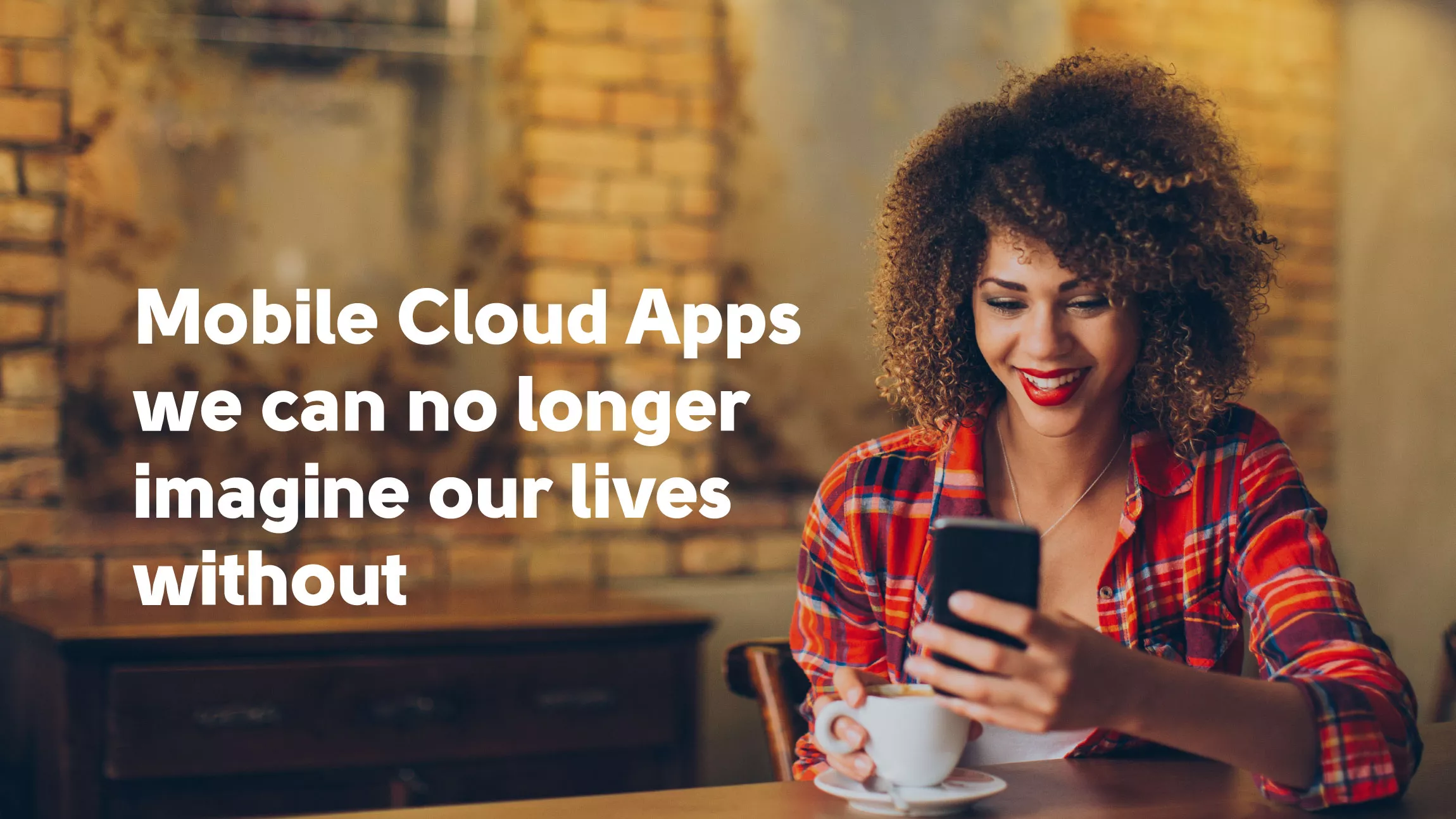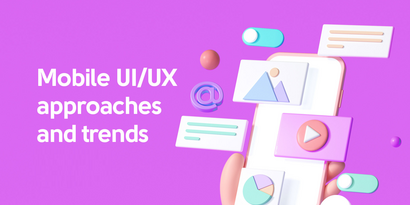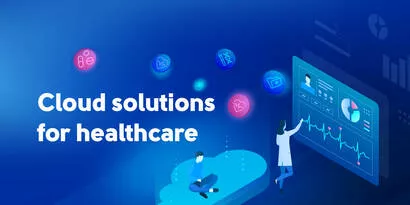
Mobile Cloud Apps and cloud-based solutions we can no longer imagine our lives without
Mobile cloud apps are one of the most recent developments in app development, and they offer organizations and developers numerous benefits over traditional native apps. As such, it is not surprising that cloud-based applications have gained popularity as of late.
Cisco's Global Cloud Index predicted that by 2021, cloud data centers would process over 94% of workload and computing processes. Moreover, according to recent research, the cloud services market is set to hit $454.2 billion in 2022 and will surpass $1,630 billion by 2030. The global Software as a Service (SaaS) market is expected to reach a value of $720.44 billion USD by 2028 at a CAGR of 25.89% over the 2022-2028 time period.
The cloud-based mobile app phenomenon is here to stay and shows no signs of stopping. But, what is a cloud-based solution? Who are they top players in the market? What cloud-based apps are the hottest ones in 2022?
In this piece, we’ve condensed the mobile cloud apps and cloud-based solutions we simply can’t live without. From email, food delivery, trackers, calendars, banking, photos, coworking, music, books, and more, it seems that in today’s world, there truly is an app for everything.
What are Cloud Based Solutions?
Cloud-based applications leverage the capabilities of mobile cloud computing to deliver applications to a wide range of mobile devices over the Internet. Traditional mobile applications require download and installation on a specific device. Cloud-based mobile applications are accessible from practically any Internet-connected mobile device or computer.
The underlying principle of mobile cloud apps is to increase productivity by providing improved app accessibility. With an Internet connection and a mobile device, users can access the application at any time.
The development of cloud-based mobile applications can be divided into three separate categories mostly determined by the mobile application's architecture:
- Software as a Service (SaaS): SaaS mobile cloud applications are by far the most prevalent and rapidly developing cloud-based services. The vast majority of cloud applications adhere to SaaS design and operate on remote third-party hardware. Users are frequently drawn to these applications since they do not need to acquire software licenses or worry about local storage. Users can instead access the application and any associated data or files through the Internet. You have likely used mobile SaaS cloud applications previously. Examples of popular applications are Gmail, Grammarly, and Dropbox.
- Infrastructure as a Service (IaaS): With an IaaS cloud-based app model, infrastructure and support are provided by a third party in the cloud. The developer of a mobile application provides the application, in-app support, and middleware. Google Compute Engine, Amazon Web Services, and Microsoft Azure are examples of widespread IaaS applications.
- Platform as a Service (PaaS): PaaS cloud-based applications demand only the application code from the user. This type of mobile cloud application eliminates the need to manage hardware and operational chores like equipment procurement and maintenance, enabling the developer to solely focus on development and support services. PaaS providers manage upgrades and maintenance for both hardware and software. Google App Engine and OpenShift are two popular PaaS options.
Why are Mobile Applications connected to the Clouds?
Since smartphones and other mobile devices have access to a high-speed internet connection, it is only logical that the quickly expanding mobile development industry is looking to reap the benefits of this modern technology.
You wouldn’t be far off in believing that cloud-based applications resemble web applications. These two development approaches are closely related and share key similarities in terms of data storage and user access. Yet, they differ in terms of scalability and security as mobile apps in the cloud are more secure and scalable than web apps.
The processing of applications and the storage and retrieval of data are performed by a cloud-based infrastructure in mobile cloud computing. It reduces total cost of ownership since IT personnel do not need to update individual devices; the client software environment runs on a server in the cloud, and any changes made there are reflected on all clients.
From the user's perspective, there is also a practical and convenient benefit, since you can now access your desktop — a virtual desktop in the cloud — from anywhere, using a mobile browser. You have the same desktop experience regardless of the remote device you use.
Business/Office Mobile Cloud Applications
In the workplace, the rise of mobile app usage has risen significantly especially with remote work being the predominant trend. Research shows that 71% of Americans work from home all or most of the time with 84% of company leaders planning to let employees work remotely at least some of the time after COVID-19. In addition, 85% of organizations implemented “bring your own device” (BYOD) policies because of the pandemic.
Next, we’ll review some of the most commonplace mobile apps used for work purposes.
Office/Productivity Applications
Productivity tools exist in a variety of shapes and sizes, and they each take a unique approach to optimizing your workflow. In essence, productivity office apps aim to help you get organized, improve work habits, and increase your focus.
Having your “office” in the palm of your hand has revolutionized the way people go about their work. For example, the Microsoft Office 360 productivity apps are some of the best around and some of the most widely used ones. Excel, Word, Teams, PowerPoint…these apps are close to having your desktop in your handheld device.
Another key player is the Google suite of products, including Google Docs, Google Sheets, Google Slides, and more. These polished and impressively capable productivity apps have a tight integration with the Google ecosystem, making it a go-to for synchronization, collaboration, and effortless cross-device access.
Other noteworthy mentions include Trello, Serene, Monday, Airtable, and more.
File Storage Applications
File syncing and storage services enable you to access all of your data—Word documents, PDFs, spreadsheets, photographs, and other digital assets—from any location. You no longer need to be seated at your work computer to access your work files.
You can access them from your laptop at home, your smartphone on the move, or your tablet on the sofa thanks to cloud syncing. Syncing and storage services also improve your online safety and security because when you sync your files via the cloud, you automatically create a backup of them. If you lose your laptop, you may still access all of your files by logging into your syncing service from any computer.
File synchronization and collaboration are key to the workspace and there are mobile apps that allow for said cloud synchronization and cloud-based storage including Microsoft OneDrive, Dropbox, Box, Google Drive, and more.
Meeting/Messaging Applications
During the pandemic, nearly every employee turned to meeting/messaging apps to stay connected. Since Slack and Zoom won over employees' hearts, business messaging and meeting apps—also known as team messaging apps or videoconferencing apps—have become the de facto medium for intra-office communication.
These apps combine instant messaging, text messaging, private forums, video calls, file sharing, and occasionally screen sharing into a single collaboration hub. As a result, there is a single location where colleagues may communicate or ask inquiries, both in real time and asynchronously.
Team messaging apps are among the best productivity tools because they make it easy to track conversations, promote teamwork, and aid in the preservation of company culture. Many team members in organizations and industries are using video meeting apps to have meetings as simple as a weekly team meeting or as big as board meetings, making significant company decisions over video. Many people are new to video conferencing, and there has been a learning curve as people of all ages become more acquainted with video tools like Zoom, Microsoft Teams, and others.
Business messaging apps provide various advantages over email:
- They promote brevity.
- The majority of discussions are opt-in. You are free to participate in conversations that are meaningful to you, and you are also free to ignore anything that is irrelevant.
- Messaging apps provide permanent, continuing discussions, which email does not.
Some of the most noteworthy meeting and messaging apps include Slack, Microsoft Teams, RingCentral, twist, Google Meet, and Zoom.
Work Management Software
Task/project management tools have rapidly grown thanks to the advent of cloud technology and the rising demand for new software. Most work/project management applications offre core features to create and assign tasks, leave task comments, generate reports, deploy email notifications, and more.
Some of the most prominent work/project management software applications include Atlassian SaaS, Zoho, Trello, Todoist, and Asana.
Calendar/Notes/Reminders/ToDo Applications
We've progressed from conference rooms and round tables to Zoom meetings and Google Hangouts in the last few years, which means that the way we cooperate and interact will change. Enter remote collaboration tools, particularly note-taking apps. Similarly, calendar or reminder apps help keep your busy work life organized and productive by giving you a centralized space to manage all your due dates, meetings, events, reminders, and more.
Some of the most prominent calendar, notes, reminders, to-do applications include Evernote, Notion, Google Calendar, OneNote, Google Keep, Apple Calendar, Outlook, and Timepage.
Digital Marketing Apps
Mobile apps now make it feasible for organizations to manage their digital marketing efforts from a mobile device. Managing mobile content from a desktop is sometimes inconvenient, so it makes sense that mobile apps cater to mobile content.
From features like the ability to create professional images for social media, access content analytics, leverage professional pocket editors, run marketing campaigns, schedule social media posts, and more, digital marketing apps are the bread and butter of digital marketers.
Some of the best, most sought-after digital marketing apps include Google Analytics, Facebook Ads Manager, Hootsuite, Buffer, Later, and Salesforce.
Mobile Banking Applications
Mobile banking apps have greatly evolved. Mobile check deposit was formerly thought to be cutting-edge technology. Consumers have learned to expect this type of capability, as well as seamless money transfers, bill pay, ATM locators, and other features.
Some apps now allow you to track accounts from various financial institutions. Others include integrated financial wellness and budgeting solutions.
Key players include Apple Pay, Google Pay, Square, BNP Group, and PayPal (which is in fact a digital wallet but offers several money management features).
Personal Mobile Cloud Applications
Users everywhere have a "signature" app that is the first one to show up on a new device, no matter how tech-savvy they are.
According to Statista, “as of the first quarter of 2021, Android users were able to choose between 3.48 million apps, making Google Play the app store with biggest number of available apps. The Apple App Store was the second-largest app store with roughly 2.22 million available apps for iOS.” Typically, an average mobile phone user has about 40 apps, splitting 89% of their time between 18 apps. Other sources claim the average person uses about 9 apps daily and 30 apps in total every month.
Next, we’ll review some of the most unpassable mobile apps for personal use.
Photos and Video Sharing Applications
Much more than mere photo-sharing apps, these platforms now allow people to shop, build their personal or business brand, find areas of interest, safely store photos, declutter photo libraries, and more.
People share their favorite photos and videos online on social media sites like Facebook and Instagram, but some people want more privacy options or just don't like social media. Sites that are just for sharing photos and videos let you store and organize your media and then choose who can see it.
Some of the most beloved photo and video sharing apps include Google Photos, Instagram, Apple iCloud, Amazon Photos, Gemini Photos, WeTransfer, and more.
Music and Video Applications
Good music and video can be a great way to get more done. It can quiet your mind and help you focus, or it can just make you feel less stressed and more at ease, which will help you get more done at work.
Nine out of ten workers are better at their jobs when they listen to music. One study found that 88% of people did better on tests and 81% got their work done faster when music was playing.
Some of the best music apps out there include Spotify, Deezer, Pandora, Google Play, Amazon Music, TuneIn, and more.
Books and Reading Applications
Who doesn’t love a good book? Whether you’re commuting, traveling, on the beach, or at a coffee shop, people enjoy taking and reading books with them. Of course, it would be tricky to carry all the books you want with you, so luckily, there are plenty of mobile apps that allow you to access, purchase, and read books on the go.
Some of our favorite books and reading apps include Bookfunnel, Kindle, Nook, Scribd, Google Play Books, and Comixology.
GPS Navigations and Maps Applications
Having GPS and apps that help us find our way around has made our lives so much easier. When driving to a new place, you no longer have to ask people on the street for directions. If you have a GPS app on your phone, you will never get lost.
In fact, emarketer.com says that more than 90% of US consumers under 50 years old use GPS apps. The best navigation apps are also easy to use, and some have features like traffic and weather alerts, multiple stops, route optimization, and location sharing.
Most of the time, we think of Google Maps when we think of an app for getting around. But if Google Maps doesn't work for you, there are plenty of other options including Waze, Apple Maps, Moovit, TomTom GO Navigation, MapQuest, and Polaris GPS Navigation, to name a few.
Smart Home Applications
Smart home applications are all about making your life easier. Smart home technology has definitely come a long way in such a short time. A home automation system lets you control everything in your home. Apps for smart-home mobile automation turn the phone into a remote control. And that's how you can start to make your home smarter.
Some of the best smart home applications include Apple Smart Home, Google Home, Samsung’s SmartThings, Alexa, Ecobee, Wemo, and Honeywell Home.
Food and Restaurants Applications
Nobody wants to spend all of their time cooking. Some days, you just want to sit back and relax, whether by ordering takeout or going out to a nice restaurant nearby. Some of the best food and restaurant mobile apps include Yelp, Foursquare, UberEats and OpenTable.
Sport, Health and Wellbeing Apps
Tracking your progress on your phone using a fitness or health app can be a terrific starting step toward a 'healthier' you. So we looked at some of the top health and fitness apps available right now. Some of the best health and fitness apps to help you achieve your health and wellbeing goals include Pacer, MyFitnessPal, HealthEngine, Happify, Strava, and more.
Summary
Mobile cloud solutions work effectively and successfully on the mobile space to solve everyday tasks from the comfort of your handheld device. Once the app is installed, you can work virtually anywhere in the world with only two things needed: a reliable internet connection and your device.
The comfort, security, and scalability they provide increasingly make cloud-based mobile applications the go-to alternative instead of choosing to develop native apps for enterprises. As with mostly anything, there are advantages to both native and cloud application development, so it’s best that you consult with an app development partner like Svitla Systems with years of industry experience and technical skills if you're uncertain about the way to take your app development project.
Reach out to one of our representatives so we can help you make the best decision for your mobile application development project.
Let's discuss your project
We look forward to learning more and consulting you about your product idea or helping you find the right solution for an existing project.
Your message is received. Svitla's sales manager of your region will contact you to discuss how we could be helpful.



